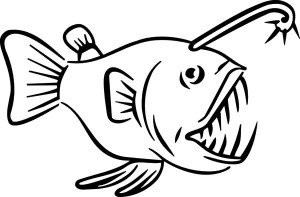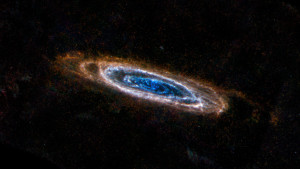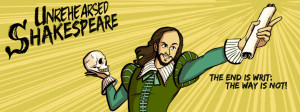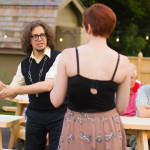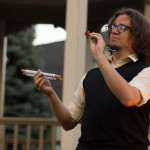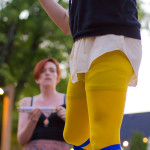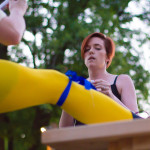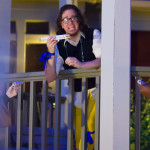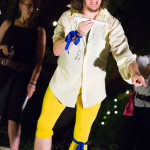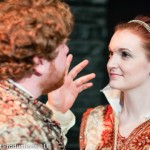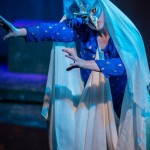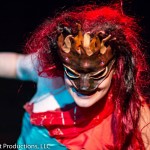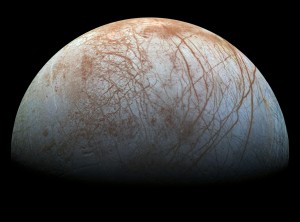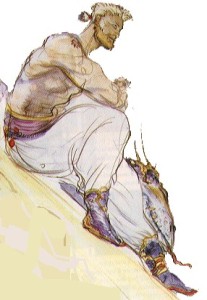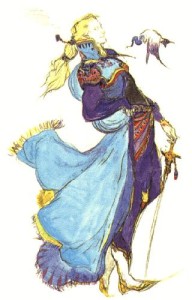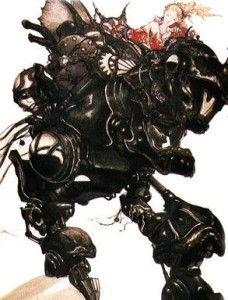Carnifex lay quietly gasping on his rock. It was only a few seconds, though, before he managed some deep, calming breaths. He would not beg or whimper or give up. He would not let her break him. He lied there, trying to blend into the rock by virtue of stillness. There was no point in camouflaging himself: they both could see body heat, and both had the ability to pierce through any illusion he conjured if they had a mind to look.
That was Carnifex’ life in a nutshell. He’d been raised on stories of heroes who could summon fires to fly into the distant Sun or lift enormous rocks over their heads. He began to see himself in these heroes, and thought his power over visions to be a sign of his own greatness. How perfectly fitting, that the only other people on Europa were virtually impervious to his special gifts. When your sister could fry you to death by pointing a finger, and your mother could immobilize you with unspeakable pain at the flick of a wrist, it was difficult to take pride in a little impotent legerdemain.
Of course, the stories were not for him. Lorelei was not his sister, and Fortunato was certainly not his mother; but he was raised alongside the girl, it was only natural to assume. With no other boys around, he had assumed the male of the species just looked very different from the female. Carnifex had assumed a lot, and Fortunato had been perfectly happy to let him assume; at least, to the extent that any of Fortunato’s decisions could be described as ‘happy.’
It was only in the last few years that he had finally and embarrassingly begun to notice fissures in the familial facade he had constructed. On the one hand, even Fortunato and Lori had clear divergences in their appearance, so it seemed not unreasonable that he should be so different. And if Fortunato’s rare indulgences and acts of decency seemed reserved solely for her daughter, well, what parent did not submit to a little favoritism? The parents in Fortunato’s stories certainly did. And every time that she, with a flick of the wrist, sent him writhing in pain and scampering into some crevice, as though he could outdistance her power, he told himself it was a punishment he had earned, rather than a condemnative expression of disdain that (he only recently noticed) had not once been leveled upon his sister.
And Lorelei. His sister. He remembered with knife-like clarity the day that illusion fell away. It had begun like any other: after sharing a breakfast, she went down to the cave for her morning lessons, while he set about cleaning the incubators. By lunchtime, after he had finished maintaining their life-support instruments, she would have finished her morning education. He would whip up a quick lunch, and she would share what she had learned with him. Carnifex often felt that he understood the principles of physics, geometry, linguistics, and astronomy better than Lori did, but of course he was being taught by his compassionate and motivated sister, not by the implacable and impenetrable Fortunato; besides, Carnifex learned at an early age that most self-evaluations were motivated in no small part by vanity.
But this lunch, not two years past, was very different. She arrived as always, he prepared their lunch as always, and they sat to eat as always. She described some basic principles of biology and anatomy to him. Such lessons were uncommon, and almost always took place after lunch, so Carnifex rarely learned anything of biology. Fortunato was often nearby at dinner, and very clearly disapproved of Lorelei’s teaching. But for this lunch, Lori seemed well prepared. She had diagrams of Carnifex’ own anatomy, as well as a diagram of some alien biped.
Mirrors were not plentiful on Europa, but Carnifex had seen himself on occasion, and Fortunato had made it quite clear from an early age that his appearance was bizarre and frightening. His great jaws, his glassy eyes, his tail, all his various aquatic features served to make him a thing of disgust. Yet he was not resentful of this; on the contrary, it had made him all the more appreciative of his sister’s attention and affection.
But that day, her attention and affection seemed to have evaporated. Breakfast had been perfectly normal, but now she discussed anatomy with a distant, reserved air. She described Carnifex’ inner workings with a calculated and tentative manner. At length, he asked her about the second diagram. She explained that it described the anatomy of a human male.
Neither of them said anything. They were both, he decided, humiliated to have thought for so long that they were of the same species, that they were sister and brother. Neither of them ever commented on it. Indeed, they still referred to each other as siblings. Just not very often. Anymore.
It happened gradually then, his becoming separate from them. Indeed, though Lorelei grew distant and estranged, Fortunato had not altered her behavior toward the boy in any concrete way. Rather, his comprehension of her treatment became clearer. The cold looks, the lack of any sentiment, the chores that he alone performed while Lorelei received an education, the painful punishment for wrong-doings actual and imagined and assumed; all made perfect sense now. He was not a son, he was a servant.
Carnifex used to entertain Lorelei at breakfast and dinner with his illusions. He would craft tiny people and animals, bereft of detail, and have them dance and fight and perform all manner of wonders. They would prance around dishes or seem to swim in a paste as she was about to eat it. Neither child seemed less amused than the other. Their senses of humor were identical. These antics stopped that day, and Carnifex’ ability to craft illusion became largely obsolete.
Naturally, he began to wonder who he was and where he had come from. Somehow, these things didn’t matter back when he assumed the three had come from the same place, from the same people. He knew nothing of his origins and assumed that Lori knew nothing either. Now he understood that his story was very different from hers, and he began to wonder: were there things that Lorelei had failed to tell him, not through absentmindedness or lack of interest, but rather by deliberation?
Carnifex now spent what leisure time he had alone. He cleaned and maintained the equipment quickly to spend more time away from the Nest. Europa was vast, but he could not go far without being missed (at least, without his labor being missed), so he found what abandoned crags and promontories he could and made them his. In a world of three people, privacy was not hard to come by, despite his chores.
There, alone, Carnifex began to craft new illusions. Sitting atop a great ice-cliff, he would cast swathes of people in the valley below: people like him, villages of little metal huts filled with wizards, warriors, commanders, and humble farmers, living out their lives. Sometimes, he would create an illusion of himself and place it down with the others. The illusory Carnifex was always smaller than the others, duller, and damaged, hobbling in no particular direction. The other illusions ignored it.
The thought of being ignored in effigy brought him back to the present. It was morning as he recalled, though he had not examined his watch recently. Both Lorelei and Fortunato possessed internal mechanisms that allowed them to tell the time at any instance, while Carnifex must rely on his chain and fob. Even this galled him, but slowly he returned to his senses and listened. They were not at lessons, despite the presumed hour. No, Lorelei had birthed the storm; rather, Fortunato had used her to birth the storm. Even now, the skies roiled and raged in multifarious shades, beautiful and terrifying, but far away. The two were talking, Carnifex all but forgotten.
Lori was as close to shouting as she ever got; which is to say, she spoke in a clear voice without murmuring. “Who were they?” she demanded, almost.
Her answer was as leathery as her neck. “My enemies.”
“Who?” she countered. “What enemies? Who are they? Who – who are you?”
Fortunato’s hesitation was palpable. Carnifex breathed, calmly, quietly, invisibly. If the woman remembered him, looked at him, and saw him awake and attentive, he was certain there would be no revealing of secrets here. He stared off into space, and eventually, the old magician continued.
Fortunato’s lens softened into green. “I’ve tried to be a good mother to you, Lorelei. It was never in my nature to nurture,” she smirked with ostensible self-deprecation, “but I tried. I’ve been good to you, haven’t I?”
Lori nodded, without hesitation. Whether she was well-trained or genuinely thought the sorceress had been anything more than just and severe with her, Carnifex was unsure. But then, perhaps a just and severe mother was a good mother. And of course, the daughter’s only means of comparison was the incapacitated beast that lay nearby, still struggling not to gasp lest he be remembered.
The mother rasped on. “You are kind, though you did not learn that from me. I am grateful for it all the same.” She made a show of looking up at the slowly calming sky. “Very well. The people who have come, whom Providence has delivered into our seas, are those who abandoned us here two decades ago. They are our jailors, foolishly returned to confirm my death. Instead, I will confirm theirs. Slowly.”
“This…” Lorelei struggled to maintain eye contact. “This is a prison? Are you unhappy here, mother?”
Her face grew darker still, and she seemed suddenly larger than she was. “A gilded cage,” she began. Then, just as suddenly, the sense of enormity was gone. She was again an old, bizarre creature. “But,” she finished lamely, “you know the expression.” The irony, not surprisingly, was lost on Lorelei
Fortunato performed a half-shrug of sorts, glancing around like a bird of prey. Luckily, her sights were focused on the sky. “Lorelei, your mother was once a proper scientist: the Head of Research and Development for the Europa Project.”
“Aren’t you my mother?” To a stranger, it might have made her look dull-witted, but Carnifex sensed the subtle coyness underneath.
Fortunato flattened her lips into the straight line that often stood in place of a smile. “Well done. Yes, less poetry. I was the Head of the Europa Project. I lived on Earth.”
Now Lori looked genuinely out of her depth. “Earth is… is real?”
Carnifex had wondered himself sometimes, but the affection and more often resentment with which Fortunato described Earth, the home of so many of her stories, made it appear unique, giving it an air of authenticity that other story-lands lacked. “It is, and their concern was Europa, and the endless supply of water to be found here. I was in charge of researching colonization: the prospect of living on Europa,” she appended unnecessarily, betraying the bottomless underestimation she had for her daughter’s linguistic prowess. “I was part of the first manned mission. There were errors of foresight, which I later realized to be deliberate. I was marooned upon this ocean in a sea of stars, alone.”
He could see his nominal sister’s hesitation. Her desire for validation was at war with her need to comfort her mother. In the end, her mother won, as always. “I’m sorry. I never knew.”
Fortunato stuck her jaw out and nodded. “As was my design, for good or ill. Your innocence was a great comfort to me, Lorelei. The joy and wonder you felt made this frozen wasteland seem a paradise, producing life out of infinite death.”
Carnifex could practically feel Lori radiating at this praise. “I had a good childhood,” she answered, somewhat equivocally.
There was a frisson of tension in the air. The sensor that had replaced one of Fortunato’s ears seemed to sway erratically. Her eye lens faded into a mottled bronze-and-gold that Carnifex had never seen before. “It’s time to begin,” she said, abruptly abandoning her anemic poesy.
Fortunato stepped away several paces. A click of her fingers brought Lorelei up behind her, her slight frame eclipsed by the sorceress’ voluminous robes. She flicked her wrist and Carnifex gasped. No pain came.
He held his breath. Fortunato tensed further, and he knew then that she had heard. She turned her neck a sickening degree and looked directly into his eyes. She did not speak, but it was painfully clear that Carnifex was expected to vanish. He covered himself with light and stayed in place. Seemingly satisfied, Fortunato turned back.
She was looking toward a dune of grooved ice, bereft of defining detail, waiting. Lorelei clung at her back like a marsupial upon its mother’s belly. And Carnifex lay alone, invisible and hoping to be forgotten.
In less than a minute, someone crested the dune.

